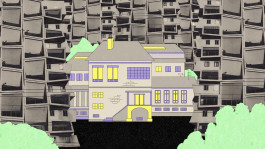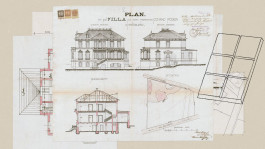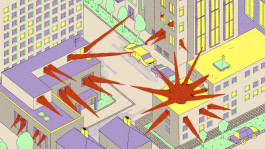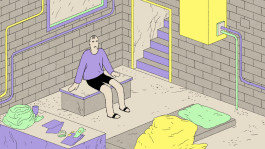


NON-EXISTENCE OF
SUSTAINABLE HOUSING
Presentation of the project Architecture of Sharing:
From Crisis to Resilience
At a time when decent, affordable housing is becoming a utopian ideal for more and more people, there is an ever greater need to seek functional long-term solutions. The severity of this situation can be mitigated, for example, through cooperative organizations that support a collective and financially sustainable approach to property management. One such initiative is the cooperative housing and shared ownership network Sdílené domy (Shared Houses), whose two projects—Vzletný Racek in Děčín and První Vlaštovka in Prague—are at the heart of the interdisciplinary project Architecture of Sharing: From Crisis to Resilience, initiated by Klára Peloušková, Veronika Miškovičová, and Kateřina Krebsová from SHIFT UMPRUM, which will be presented this year at Dutch Design Week in Eindhoven (18. – 26. 10. 2025). The central elements of the exhibition will be an animated documentary film directed by Michaela Režová and a website mapping the broader systemic context of mainstream and inaccessible owner-occupied and rental housing.

There are countless apartments that remain empty.
The Shared Houses project was created in response to the housing crisis and is profiled as a practical effort to purchase market properties, renovate them where necessary, and manage them sustainably. These properties thereby become affordable housing that is legally protected so that the house cannot be speculated on in the future, and remains housing rather than a financial asset. The concept of sharing is at the heart of both the cooperative and the art/research project Architecture of Sharing: From Crisis to Resilience. Sharing and cooperation intertwine on several levels here: within the residential unit, space, resources, time, distribution of roles, and mutual assistance all exemplify sharing; at the international level, knowledge of community organizing and legal issues related to these types of properties are shared; and within the UMPRUM project, various creative disciplines and critical thinking are shared across fields, combining architecture, design, animation, and sociology.

Architectural plan for První Vlaštovky.
"Community living will not solve the housing crisis, but various forms of participation—which do not necessarily involve sharing space—open up avenues for alternatives and for co-decision-making about how and with whom we live. The Shared Houses initiative is remarkable in that it approaches the housing problem systematically: it is not just individual collectives that have decided to live together, but a network based on a well-thought-out legal and financial structure. And that, in my opinion, is key—such social innovations make it possible to resist market pressures and, on a larger scale, can contribute to the resilience of society. In addition, I think it is important that Shared Houses renovate existing properties, because that is the most environmentally friendly architectural approach,"
says Klára Peloušková, describing the initiative.

A visual representation of the crisis that is pushing society out of their homes.
The aim of Architecture of Sharing: From Crisis to Resilience is primarily to present shared houses as a possible response to the acute housing crisis and to draw attention to the fact that these organizations are not a unique experiment, but are part of a European network of similar initiatives. The film combines footage from the above-mentioned locations with insights from experts, while the animated sections attempt to present the issue in an understandable visual language. The film thus functions on both a critical and educational level—it describes the issue in the Czech Republic in a factual and systematic manner, without burdening the content with excessive lamentation over the housing crisis. The malleability of animation also serves as a kind of variable information network that both illustrates the facts described and allows for the presentation of, for example, the architectural layout of the houses mentioned or archival footage.
"The task of the animation was to use visual appeal to stimulate the audience's interest in the topic and to simplify sometimes complex mechanisms visually and play with their meanings. Based on the script, we put together individual ideas in a team with Julie Černá and Hanna Palamarchuk, who were responsible for directing the animation and the visual design. Gradually, we shaped the film into a form that we can say confronts a difficult topic with ease and encourages further exploration of the issues at hand,"
Michaela Režová comments on the animation methods at work.

Unfortunately, living in uninhabitable spaces is sometimes becoming normalised nowadays.
The project also aims to free the idea of collective ownership from the traumatic, ideological baggage of the communist era in the Czech Republic, and to demystify cooperative projects from the simplistic label of hippie eco-activism. Although the cooperative behind the Shared Houses initiative bases its activities on the principles of cooperation, horizontal decision-making, ecology, equality, solidarity, and non-profit status, the project Architecture of Sharing: From Crisis to Resilience presents the association's housing policy primarily as a functional, architectural, and social endeavour that arose symptomatically from the pressing reality of the housing crisis.
From the outset, it was clear that the film would combine real footage, archival material, cartoon animation, and collage. The fact that the film would have its own "hero" was also evident in the mood board at the very beginning. Approaching Julie and Hanka to collaborate was therefore an obvious decision. However, the sound and images created by musical magician Julie Lupačová are also an integral part of the film.
Written for UMPRUM Online by Agáta Hošnová.
Michaela Režová (* 1992) is a filmmaker and director. Her work focuses on the genre of animated documentary and its forms. In recent years, she has worked as a creative director on a number of projects, including the production of films for the exhibition Design and Transformation: Stories of Czech Design 1900–2020, which was awarded the prize for best Czech animated commissioned work at Anifilm in 2023. She has conducted extensive research on the occasion of the 70th anniversary of the animation studio at UMPRUM. She is the founder of the f-a-t.cz platform, which brings content from the world of animated film under the slogan "from animators to animators." She recently completed her doctoral studies at UMPRUM, where she co-coordinates the Animation and Film studio.
Klára Peloušková (* 1991) focuses on contemporary design and innovation in the context of transition theory and systems thinking. She works at UMPRUM in Prague, where she co-leads SHIFT – Laboratory for Transition to Sustainability and lectures on design theory and design thinking. As a researcher and designer, she also collaborates with the Department of Information Studies and Librarianship at Masaryk University and the innovation studio Pábení. She is currently working on the topic of social innovations for the future in the context of informal care and reflecting on the Czech discourse on sustainability in architecture.
Kateřina Krebsová (* 1995) is an architect and researcher. Since 2022, she has been pursuing a PhD at UMPRUM titled Alternative Forms of Architectural Work. Her research focuses on projects that expand the traditional framework of the profession and address critical environmental and social issues in the Central European context. In 2023, she exhibited the results of her research residency—the project Archaeology of Architectural Work—as part of the Czech exhibition at the 23rd Venice Architecture Biennale. In 2025, she participated in a project focused on sustainability in Czech architecture within SHIFT – Laboratory for Transition to Sustainability at UMPRUM. She practices architecture at the studio Amulet and is a member of the football team Random Radical.
Agáta Hošnová (* 1997) is a graduate of the bachelor's program in curatorial studies at Goldsmiths College and the master's program in Arts & Cultural Management at King's College London. She is currently completing her studies at the Department of Art Theory and History at UMPRUM. She works at the Prague City Gallery and as a curator at the Berlínskej model gallery, and previously worked at the NIKA Gallery. She is interested in the possibilities of curatorial theory and practice, intermedia overlaps of the moving image, and art from the second half of the 20th century to the present.
The Architecture of Sharing:
From Crisis to Resilience
Concept & Screenplay: Kateřina Krebsová & Klára Peloušková @kackakrebsova @klarapelo_
Creative Director & Dramaturgy: Michaela Režová @michaelarez
Animation & Art Direction: Julie Černá & Hanna Palamarchuk @obrazkyjulie @sho_pen_
Featuring: Ludmila Böhmová, Renáta Farkašová, Vojtěch Kubát, Jan Malý Blažek, Jan Soukup
Interview & Cinematography: Patrik Trska & Kacper Senkowski @im_buck_with_my_duck
Editing & Postproduction: Ismini Vafiadu
Music & Sound: Julie Lupačová @jjjjjjjulie
Voiceover: Iris Hobson-Mazur @sword_shaped_leaves
Graphic Design: Pavlína Smékalová & Sara Maria Szyndler @tvarejakoslabikare @sunka__
Production: UMPRUM & Michaela Kaplánková
Thanks to: The First Swallow and Flyful Seagull Collectives
The project was co-financed by the EU through the National Recovery Plan, as part of the project Green Transformation of UMPRUM, NPO_UMPRUM_MSMT-2132/2024-4.
NON-EXISTENCE OF
SUSTAINABLE HOUSING
Presentation of the project Architecture of Sharing:
From Crisis to Resilience
At a time when decent, affordable housing is becoming a utopian ideal for more and more people, there is an ever greater need to seek functional long-term solutions. The severity of this situation can be mitigated, for example, through cooperative organizations that support a collective and financially sustainable approach to property management. One such initiative is the cooperative housing and shared ownership network Sdílené domy (Shared Houses), whose two projects—Vzletný Racek in Děčín and První Vlaštovka in Prague—are at the heart of the interdisciplinary project Architecture of Sharing: From Crisis to Resilience, initiated by Klára Peloušková, Veronika Miškovičová, and Kateřina Krebsová from SHIFT UMPRUM, which will be presented this year at Dutch Design Week in Eindhoven (18. – 26. 10. 2025). The central elements of the exhibition will be an animated documentary film directed by Michaela Režová and a website mapping the broader systemic context of mainstream and inaccessible owner-occupied and rental housing.

There are countless apartments that remain empty.
The Shared Houses project was created in response to the housing crisis and is profiled as a practical effort to purchase market properties, renovate them where necessary, and manage them sustainably. These properties thereby become affordable housing that is legally protected so that the house cannot be speculated on in the future, and remains housing rather than a financial asset. The concept of sharing is at the heart of both the cooperative and the art/research project Architecture of Sharing: From Crisis to Resilience. Sharing and cooperation intertwine on several levels here: within the residential unit, space, resources, time, distribution of roles, and mutual assistance all exemplify sharing; at the international level, knowledge of community organizing and legal issues related to these types of properties are shared; and within the UMPRUM project, various creative disciplines and critical thinking are shared across fields, combining architecture, design, animation, and sociology.

Architectural plan for První Vlaštovky.
"Community living will not solve the housing crisis, but various forms of participation—which do not necessarily involve sharing space—open up avenues for alternatives and for co-decision-making about how and with whom we live. The Shared Houses initiative is remarkable in that it approaches the housing problem systematically: it is not just individual collectives that have decided to live together, but a network based on a well-thought-out legal and financial structure. And that, in my opinion, is key—such social innovations make it possible to resist market pressures and, on a larger scale, can contribute to the resilience of society. In addition, I think it is important that Shared Houses renovate existing properties, because that is the most environmentally friendly architectural approach,"
says Klára Peloušková, describing the initiative.

A visual representation of the crisis that is pushing society out of their homes.
The aim of Architecture of Sharing: From Crisis to Resilience is primarily to present shared houses as a possible response to the acute housing crisis and to draw attention to the fact that these organizations are not a unique experiment, but are part of a European network of similar initiatives. The film combines footage from the above-mentioned locations with insights from experts, while the animated sections attempt to present the issue in an understandable visual language. The film thus functions on both a critical and educational level—it describes the issue in the Czech Republic in a factual and systematic manner, without burdening the content with excessive lamentation over the housing crisis. The malleability of animation also serves as a kind of variable information network that both illustrates the facts described and allows for the presentation of, for example, the architectural layout of the houses mentioned or archival footage.
"The task of the animation was to use visual appeal to stimulate the audience's interest in the topic and to simplify sometimes complex mechanisms visually and play with their meanings. Based on the script, we put together individual ideas in a team with Julie Černá and Hanna Palamarchuk, who were responsible for directing the animation and the visual design. Gradually, we shaped the film into a form that we can say confronts a difficult topic with ease and encourages further exploration of the issues at hand,"
Michaela Režová comments on the animation methods at work.

Unfortunately, living in uninhabitable spaces is sometimes becoming normalised nowadays.
The project also aims to free the idea of collective ownership from the traumatic, ideological baggage of the communist era in the Czech Republic, and to demystify cooperative projects from the simplistic label of hippie eco-activism. Although the cooperative behind the Shared Houses initiative bases its activities on the principles of cooperation, horizontal decision-making, ecology, equality, solidarity, and non-profit status, the project Architecture of Sharing: From Crisis to Resilience presents the association's housing policy primarily as a functional, architectural, and social endeavour that arose symptomatically from the pressing reality of the housing crisis.
From the outset, it was clear that the film would combine real footage, archival material, cartoon animation, and collage. The fact that the film would have its own "hero" was also evident in the mood board at the very beginning. Approaching Julie and Hanka to collaborate was therefore an obvious decision. However, the sound and images created by musical magician Julie Lupačová are also an integral part of the film.
Written for UMPRUM Online by Agáta Hošnová.
Michaela Režová (* 1992) is a filmmaker and director. Her work focuses on the genre of animated documentary and its forms. In recent years, she has worked as a creative director on a number of projects, including the production of films for the exhibition Design and Transformation: Stories of Czech Design 1900–2020, which was awarded the prize for best Czech animated commissioned work at Anifilm in 2023. She has conducted extensive research on the occasion of the 70th anniversary of the animation studio at UMPRUM. She is the founder of the f-a-t.cz platform, which brings content from the world of animated film under the slogan "from animators to animators." She recently completed her doctoral studies at UMPRUM, where she co-coordinates the Animation and Film studio.
Klára Peloušková (* 1991) focuses on contemporary design and innovation in the context of transition theory and systems thinking. She works at UMPRUM in Prague, where she co-leads SHIFT – Laboratory for Transition to Sustainability and lectures on design theory and design thinking. As a researcher and designer, she also collaborates with the Department of Information Studies and Librarianship at Masaryk University and the innovation studio Pábení. She is currently working on the topic of social innovations for the future in the context of informal care and reflecting on the Czech discourse on sustainability in architecture.
Kateřina Krebsová (* 1995) is an architect and researcher. Since 2022, she has been pursuing a PhD at UMPRUM titled Alternative Forms of Architectural Work. Her research focuses on projects that expand the traditional framework of the profession and address critical environmental and social issues in the Central European context. In 2023, she exhibited the results of her research residency—the project Archaeology of Architectural Work—as part of the Czech exhibition at the 23rd Venice Architecture Biennale. In 2025, she participated in a project focused on sustainability in Czech architecture within SHIFT – Laboratory for Transition to Sustainability at UMPRUM. She practices architecture at the studio Amulet and is a member of the football team Random Radical.
Agáta Hošnová (* 1997) is a graduate of the bachelor's program in curatorial studies at Goldsmiths College and the master's program in Arts & Cultural Management at King's College London. She is currently completing her studies at the Department of Art Theory and History at UMPRUM. She works at the Prague City Gallery and as a curator at the Berlínskej model gallery, and previously worked at the NIKA Gallery. She is interested in the possibilities of curatorial theory and practice, intermedia overlaps of the moving image, and art from the second half of the 20th century to the present.
The Architecture of Sharing:
From Crisis to Resilience
Concept & Screenplay: Kateřina Krebsová & Klára Peloušková @kackakrebsova @klarapelo_
Creative Director & Dramaturgy: Michaela Režová @michaelarez
Animation & Art Direction: Julie Černá & Hanna Palamarchuk @obrazkyjulie @sho_pen_
Featuring: Ludmila Böhmová, Renáta Farkašová, Vojtěch Kubát, Jan Malý Blažek, Jan Soukup
Interview & Cinematography: Patrik Trska & Kacper Senkowski @im_buck_with_my_duck
Editing & Postproduction: Ismini Vafiadu
Music & Sound: Julie Lupačová @jjjjjjjulie
Voiceover: Iris Hobson-Mazur @sword_shaped_leaves
Graphic Design: Pavlína Smékalová & Sara Maria Szyndler @tvarejakoslabikare @sunka__
Production: UMPRUM & Michaela Kaplánková
Thanks to: The First Swallow and Flyful Seagull Collectives
The project was co-financed by the EU through the National Recovery Plan, as part of the project Green Transformation of UMPRUM, NPO_UMPRUM_MSMT-2132/2024-4.